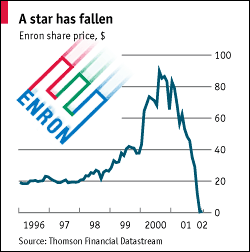
After our lecture on financial accounting I became very interested on learning more about accounting fraud; and even more so when considering Professor Silver’s insight on ethics. Therefore, I decided to look into Enron, which is the biggest scandal I had ever heard of.
Enron was considered innovative and at the same time had strong roots within XXth century business. It primarily sold “gas and electricity futures”, and also “thrust itself headlong onto the Internet”. It was a perfect mix between old and new markets, which made it a very popular pick in the 90’s stock market.
Consequently it came as a surprise when they admitted to misstating both its income and equity. After doing so, Enron declared bankruptcy.
What I found most interesting about the scandal was the fact that a publicly traded firm could hide so much information from auditing corporations. Enron created new firms in which they would dump their huge losses to make it seem as if they were actually profitable. The move was extremely unethical due to all the negative implications it had upon the stakeholders.
The investors were much worse off as they lost the majority of their investment on the firm.
Workers lost their jobs and hence were negatively affected.
What I believe might have been the main problem involved with the accounting firms that audited Enron was their lack of analysis when it came to the cash flow. If they had also taken the time to audit not only Enron’s cash flow, but also the cash flow of Enron’s partners they may have realized the heavy losses undertaken by the subsidiary firms, and thus link them back to Enron.